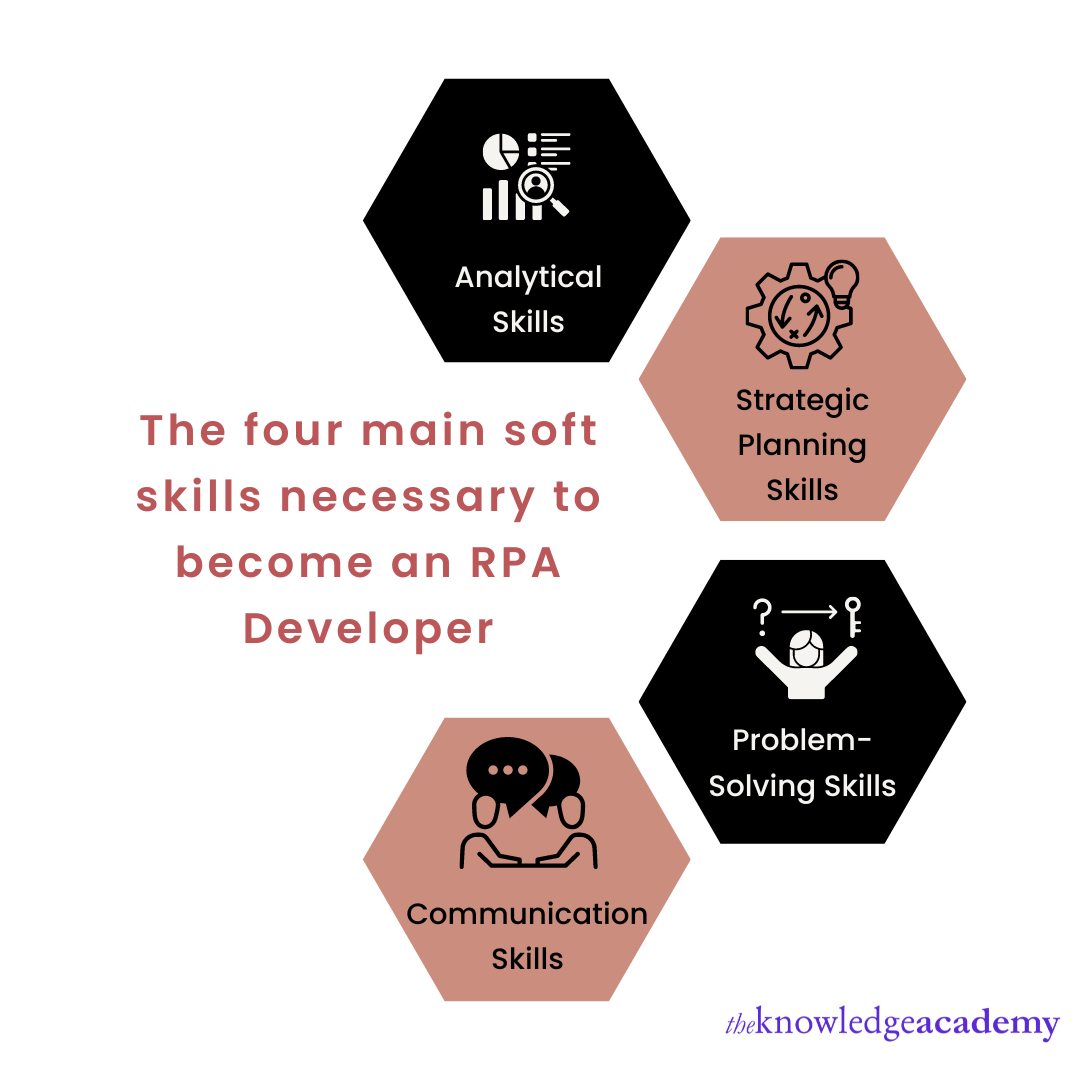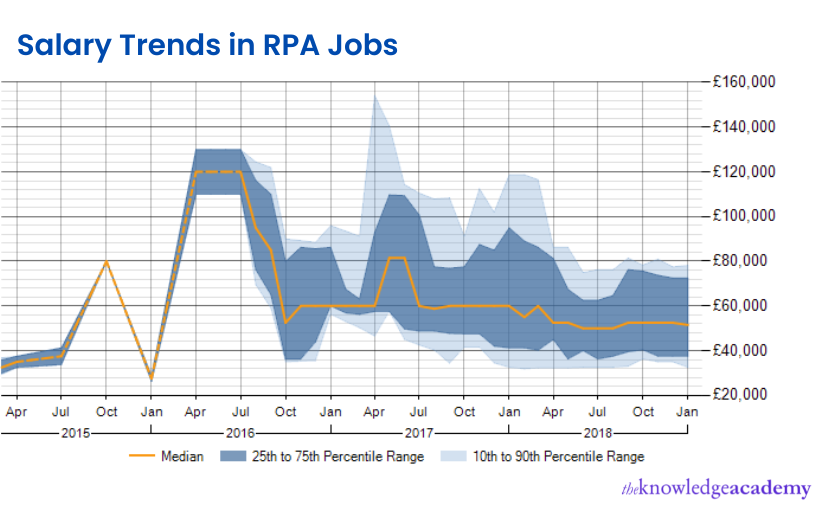We may not have the course you’re looking for. If you enquire or give us a call on + 1-866 272 8822 and speak to our training experts, we may still be able to help with your training requirements.
Training Outcomes Within Your Budget!
We ensure quality, budget-alignment, and timely delivery by our expert instructors.

Robotic Process Automation Developer or RPA Developer is one of the job positions experiencing a popularity surge today. As RPA software seeps into the technological infrastructure of companies, the requirement for its developers has increased.
Various industries make use of RPA. According to Gitnux, It is reported that adopting RPA will considerably increase in the finance, procurement, HR, and GBS sectors in the next 2-3 years. As demand for RPA increases, so does the requirement for Developers in RPA across organisations. In this blog, you will learn how to become an RPA Developer who efficiently handles repetitive tasks in corporate sectors. Read More!
Table of Contents
1) What is an RPA Developer?
2) How to become an RPA Developer in 2023?
3) Skills Required for RPA Developers
4) RPA using UiPath
5) RPA Developer: Employment Routes
6) Conclusion
Improve your understanding of Debugging and Visualisation by signing up for our Robot Framework Training course now!
What is an RPA Developer?
An RPA Developer is responsible for designing, building, and implementing RPA machines. They help optimise business processes by improving functionality and efficiency. Automation might be a familiar concept for most organisations, and they help employees ease into it by solving automation-based problems and designing automation tasks.
They make use of their extensive knowledge on the subject to fix the tiniest problems regarding automation. Testing and code debugging are a few of the common responsibilities of a Developer. By solving such issues, they manage and maintain the smooth workflow of automation projects.
How to Become an RPA Developer in 2023?
Becoming an RPA Developer begins with obtaining a bachelor's degree in computer science or any other IT-related field. Pursuing higher education is the preferred next step. If you have a vested interest in RPA and ample knowledge of coding languages and RPA tools, becoming a Developer in RPA is the best option.
The main RPA Developer role and responsibility is essentially improving organisational workflow. Some of their responsibilities include using RPA tools to code, design review and reviewing automation code, configuring RPA tools using automation, documenting the entire automation process, and designing automation based on company objectives.
Apart from degrees, there are specific important soft skills and technical skills that are required to embark on the RPA pathway. Mastering these skills helps shape you to fulfil your roles and responsibilities as an RPA Developer.
Learn to define windows adapter design properties by signing up for our OpenSpan RPA Training course now!
Skills Required for RPA Developers
As mentioned above, Robotic Process Automation Developers are responsible for building automation tasks and solving related issues to maximise work efficiency. After identifying issues, they are required to monitor further automation processes to improve themselves in future.
These are just a few of the responsibilities that will fall on them. Therefore, exercising this role requires a vast knowledge of multiple skills. Here are some of the RPA Developer skills that include both soft and technical skills needed to become a Developer in RPA.
Technical Skills
The quality of your technical skillset and your business-oriented performance will make you successful in all job roles regarding Robotic Process Automation. Here are some technical skills to help you become a good RPA Developer.
a) Coding Skills: A basic familiarity with coding languages can help immensely. Coding or programming languages like C, C++, Java, Python, etc., are the most observed. Basic knowledge of these languages can help you succeed in your career.
b) Understanding of Artificial Intelligence (AI) and Machine Learning (MI): The objective of introducing RPA to organisations is maximising efficiency. As automation processes are built on AI, a Developer in RPA requires basic understanding of AI. Similarly, since RPA machines are used to cut down employee workload, knowledge of ML is highly recommended.
c) Automation Tools: Developers in Robotic Process Automation must know the workings of multiple automation tools that can be integrated with RPA software. Automation tools like UiPath help automate dispensable tasks in Windows, eliminating human involvement.
d) Data Analytics: Data integration skills are essential in this field. A fundamental grasp of any database query language like SQL is mainly helpful. This allows developers to identify the dynamic data of the company and helps Bots retrieve data using SQL queries.
Soft Skills

The skill requirement for becoming a Developer in RPA is not completely reliant on your understanding of technical aspects. Other qualities help one succeed in the RPA arena, and here are some soft skills that can help you become a good Developer.
a) Analytical Skills: Automating processes are bound to be elaborate and complex. RPA Developers need strong analytical skills to carefully observe multiple processes, identify faults, and introduce improvements.
Automating tasks takes a lot of pressure off employees. Developers in RPA oversee maintaining the technology that allows for work streamlining. Their analytical skills can help improve existing technology and ensure smooth workflow.
b) Strategic Planning Skills: Multiple aspects of RPA software might need to be investigated at different points in time. A good RPA Developer must have good planning skills that allow them to devote their time judiciously to all kinds of concerns.
Planning to hit design goals or even mapping out your desired workflow can help in an improved workflow. Therefore, creating plans associated with the company's RPA objectives will prove broadly helpful.
c) Problem-Solving Skills: Robotic Process Automation software can be challenging for most organisations as it is a relatively new technology. This leads to mishaps in programming methods according to the organisation's preferred workflow.
Being a Developer means putting out fires at any random time, which calls for a strong problem-solving attitude and the necessary problem-solving skills. Bugs are a frequent interruption, and testing and fixing bugs are just one of the tasks that will come your way.
d) Communication Skills: Any job or role in an organisation demand excellent communication skills. As an RPA Developer, you are responsible for one of the essential technological solutions used by your company. It falls on you to communicate the pros, cons, methods of use, and more to its users.
Everyone using the technology will require consistent updates about every little change or improvement the software goes through. End-users, development teams, and stakeholders must be kept in the loop.
Improve your understanding on the Blue Prism system and RPA automation processes. Sign up for our Blue Prism Training course now!
RPA using UiPath
UiPath is easily one of the commonly used RPA tools that provide free automation solutions. Companies that wish to streamline their business processes and tasks make use of it. As mentioned, UiPath helps automate repetitive tasks in Windows, minimising human involvement.
Earning one of the UiPath certifications is a highly recommended pathway. Although, a working knowledge and experience of RPA software can be advantageous. If you plan to acquire a UiPath certificate, the exam has two phases – theory and practical.
RPA Developer: Employment Routes

If you are someone who has chosen a path in RPA, then you have chosen right. With RPA's popularity rising globally, various job openings in this field pop up frequently. Here are some of the employment routes you can avail of to secure RPA Developer positions.
a) RPA Companies: RPA consultancy firms are a good starting point to launch your career in RPA. A good percentage of these firms provide services to large organisations. The process automation solutions for all their clients and grow their business.
Many companies are adopting RPA nowadays and need people who can implement and maintain them. Getting a direct hire into such companies can inevitably improve your resume and help in your career advancement. Growing in such companies in positions like Junior RPA Developer can be a rewarding experience professionally and personally.
b) Tech Companies: Companies that provide automation solutions to end-users are on the lookout for hiring Developers in RPA. Various tech companies like Cognizant, Accenture, Deloitte, Genpact, IBM, etc., use RPA.
c) End Users of RPA: Instead of seeking help from RPA consultancy firms, certain companies want to employ RPA Developers directly. Although such companies are not high in number, they can be handy for aspiring youth. Applying through job application portals or going through referrals are a few ways to help you secure a job in such companies.
d) Veteran Developers: More than your employment proof, your credibility as an RPA Developer will help you advance in your career. For starters, you can improve your credibility by recording your accomplishments in creating software bots and plugins.
Eager to learn more about Robotic Process Automation, refer to our blog on "RPA testing"
Conclusion
In the current employment scenario, the job of an RPA Developer is highly valued. Becoming a successful Developer in RPA involves brushing up on certain skills detrimental to securing the job. We hope this blog has helped improve your understanding of the ways to become a Developer in RPA in 2023.
Learn about the fundamental concepts of UI Automation. Sign up for our Robotic Process Automation using UiPath course now!
Frequently Asked Questions
Upcoming Business Analysis Resources Batches & Dates
Date
 Robotic Process Automation using UiPath
Robotic Process Automation using UiPath
Thu 9th Jan 2025
Thu 13th Mar 2025
Thu 12th Jun 2025
Thu 7th Aug 2025
Thu 18th Sep 2025
Thu 27th Nov 2025
Thu 18th Dec 2025







 Top Rated Course
Top Rated Course



 If you wish to make any changes to your course, please
If you wish to make any changes to your course, please


